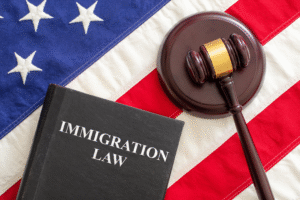Immigrating to the United States is a dream-like goal for many. In order to start a new life in the United States, a land of vast land, diverse culture, and endless opportunities, you must obtain the right immigration visa. However, the types and conditions are complicated and it can be overwhelming to know where to start.
In this article, we will take a closer look at the major types of visas for US immigration, and thoroughly analyze the application requirements, necessary qualifications, and restrictions to be aware of for each visa to serve as a solid guide for your US immigration journey.
index
- 1. Basic understanding of US immigration visas
- 2. Family-based immigration visa
- 3. Employment-based immigration visa
- 4. Other immigration visas
- 5. Overview of the immigration visa application process
- 6. Precautions and Restrictions
- 7. Conclusion: Find the US immigration visa that's right for you
1. Basic understanding of US immigration visas
An immigrant visa is a visa that allows a foreigner to reside permanently in the United States. This is clearly different from a non-immigrant visa, which is for tourism or a short-term stay. If you enter the United States with an immigrant visa, you are eligible to obtain a green card.
U.S. immigrant visas can be broadly divided into visas based on family relationships, visas based on employment ability, and visas based on special circumstances.
2. Family-based immigration visa
Certain family members of U.S. citizens or permanent residents may apply for an immigrant visa through their family relationship.
IR Visas (Immediate Relative Visas)
IR visas are issued to immediate family members of U.S. citizens, and there is no limit to the number of visas issued per year.
- IR-1: Spouse of a U.S. citizen
- condition: You must be legally married.
- Limitations: Sham marriages are not permitted.
- IR-2: Unmarried children under 21 of U.S. citizens
- condition: Parents must be U.S. citizens, and children must be under 21 years of age and unmarried.
- Limitations: You may lose eligibility if you are over 21 or married.
- IR-3: Children adopted abroad by U.S. citizens
- condition: Must meet Hague Convention requirements.
- Limitations: You must comply with relevant laws and regulations.
- IR-4: A child who is being adopted by a U.S. citizen within the United States
- condition: Certain legal requirements must be met.
- Limitations: You must comply with relevant laws and regulations.
- IR-5: Parent of a U.S. citizen who is 21 years of age or older
- condition: The child must be at least 21 years of age, and the parent must be the biological or legal parent of the citizen.
- Limitations: You can apply after your child becomes a citizen.
F Visa (Family Preference Visas)
F visas are issued to certain family members of U.S. citizens or permanent residents, but there is a limit to the number of visas issued each year.
- F1: Unmarried children of U.S. citizens who are 21 years of age or older
- condition: Parents must be U.S. citizens, and children must be 21 years of age or older and unmarried.
- Limitations: If you get married, you may need to change to a different category, which may result in a longer waiting period for your visa.
- F2A: Spouse and unmarried children under 21 years of age of a U.S. permanent resident
- condition: Applicants must be the spouse or unmarried child under 21 years of age of a U.S. permanent resident.
- Limitations: When a permanent resident becomes a citizen, he or she may change to IR-1 or IR-2.
- F2B: Unmarried children of U.S. permanent residents who are 21 years of age or older
- condition: Applicants must be unmarried children of U.S. permanent residents, aged 21 or older.
- Limitations: If you get married, you will lose your eligibility and may have a longer waiting period for your visa.
- F3: Married children of U.S. citizens
- condition: Parents must be U.S. citizens and the child must be married.
- Limitations: The waiting period for a visa to be issued can be very long.
- F4: Sibling of a U.S. citizen who is 21 years of age or older
- condition: Applicants must be siblings of U.S. citizens who are 21 years of age or older.
- Limitations: Both the applicant and the inviter must be at least 21 years of age, and the waiting period for visa issuance is the longest.

3. Employment-based immigration visa
The United States issues immigrant visas to foreign nationals based on specific skills or employer sponsorship.
EB-1 Visa (Priority Employment-Based Immigration)
The EB-1 visa is issued to individuals with exceptional ability and generally does not require labor certification.
- EB-1A: A person of outstanding ability with an international reputation in the fields of science, arts, education, business, and athletics.
- condition: You must provide substantial evidence demonstrating outstanding ability in the field.
- Limitations: Self-petition is possible.
- EB-1B: Outstanding professor or researcher
- condition: Must have at least 3 years of teaching or research experience in the relevant field and have internationally recognized achievements. Employer sponsorship is required.
- Limitations: Employer sponsorship is essential.
- EB-1C: Executive or manager of a multinational company
- condition: You must have worked as an executive or manager in a foreign branch of the multinational company for at least one year out of the three years prior to applying, and must have transferred to an executive or managerial position in the same company within the United States.
- Limitations: Employer sponsorship is essential.
EB-2 Visa (Immigrants with Advanced Education and Special Abilities)
The EB-2 visa is issued to foreign nationals who have a master's degree or higher or who have extraordinary ability in the sciences, arts, or business. Work authorization is usually required.
- Basic EB-2: A person who holds a master's degree or higher, or a bachelor's degree and at least 5 years of experience in the relevant field, or a foreigner with exceptional ability in the science, arts, or business field.
- condition: Employer sponsorship and labor certification are required. As an exception, you can self-petition without labor certification through a National Interest Waiver (NIW).
- Limitations: Typically, a work permit is required, and an NIW is only available under certain conditions.
EB-3 Visa (Skilled/Unskilled Worker Immigration)
The EB-3 visa is for skilled workers, bachelor's degree holders, or unskilled workers with less than 2 years of experience. Labor certification is required.
- Skilled workers: Person with at least 2 years of work experience or education
- condition: Employer sponsorship and work authorization are required.
- Limitations: A work permit is required.
- Bachelor's degree holders: Bachelor's degree or higher
- condition: The job requires a bachelor's degree, employer sponsorship, and work authorization.
- Limitations: A work permit is required.
- Unskilled workers: Those with less than 2 years of work experience
- condition: Employer sponsorship and work authorization are required, and the waiting period for a visa can be very long.
- Limitations: A work permit is required and visa issuance priority is low.
EB-4 Visa (Special Immigrant)
EB-4 visas are issued to foreign nationals with special qualifications, such as religious workers, employees of certain international organizations, and members of the U.S. military.
- Religious Immigration: Religious professionals such as pastors and priests
- condition: As a member of a particular religious group, you must perform that function.
- Limitations: Must comply with relevant regulations.
EB-5 Visa (Investment Immigration)
EB-5 visas are issued to foreign investors who invest a certain amount of money or more in a new business within the United States and hire at least 10 U.S. citizens or permanent residents.
- condition: If you are investing in a designated area (TEA, Targeted Employment Area), you must invest at least $800,000, and for other areas, you must invest at least $1,050,000.
- Limitations: The source of the investment must be clearly disclosed and it must be demonstrated that the investment will create at least 10 full-time U.S. jobs.
4. Other immigration visas
U.S. immigration law sometimes provides permanent residence opportunities to foreign nationals who have very special and exceptional circumstances. The visas mentioned in the “Other Immigrant Visas” section are for these cases, based on a special interest or need for protection of the United States, rather than the individual’s general background or ability.
-
Foreign nationals recognized for special merit (Special Immigrant Visas): This category is very diverse and may be available to foreign nationals who have made extraordinary contributions to a particular U.S. interest. Some examples include:
- Religious Workers (EB-4): As previously mentioned, foreign nationals who are engaged in religious occupations, such as pastors, priests, and monks, may apply for permanent residency if they meet certain requirements. They must perform their duties at the request of a non-profit religious organization.
- U.S. Military Service Members (EB-4): Foreign nationals who have served in the U.S. military for a certain period of time, or their spouses and children, may also apply for permanent residency through a special immigrant visa. This is a form of compensation for foreign nationals who have contributed to the security of the United States.
- International Organization Staff and Family Members (G-4 Staff and Certain Relatives): Foreign nationals who have held or are holding important positions in certain international organizations and their immediate family members may also be eligible for a special immigrant visa.
- Specific information provided at the request of the U.S. Government: Special immigrant visas may also be available to foreign nationals and their family members who have provided information critical to U.S. law enforcement or national security.
-
Victims of Trafficking in Persons (T Visa): The T visa is a nonimmigrant visa designed to protect foreign nationals who have been victims of severe forms of human trafficking, such as forced labor or sex trafficking. Holders of a T visa are legally permitted to reside in the United States, obtain work authorization, and, if certain conditions are met, are eligible to apply for permanent residency. The primary purpose of the T visa is to encourage victims to leave their abusers, secure safety, and cooperate with the investigation of a crime. Applicants must demonstrate that they have been victims of human trafficking and have cooperated or are willing to cooperate with law enforcement in the investigation. Certain family members, such as spouses, children, parents, and siblings, may also receive T visa derivative status.
-
Victims of Domestic Violence (U Visa): The U visa is a nonimmigrant visa that protects foreign nationals who are victims of certain crimes, including domestic violence, and certain of their family members. U visa holders are legally permitted to stay in the United States, obtain work authorization, and are eligible to apply for permanent residency if they meet certain conditions. The purpose of the U visa is to encourage crime victims to seek safety and cooperate with law enforcement in their criminal investigation. Applicants must demonstrate that they have been victims of a crime and have cooperated or are willing to cooperate with law enforcement in their investigation. Certain family members, such as spouses, children, parents (for minor children), and siblings (for minor children), may also receive U visa derivative status.
-
Special Immigrant Juvenile Status (SIJ): SIJ is a special category that provides a path to permanent residence for certain minor aliens who are unable to obtain parental care due to abuse, abandonment, or neglect in the United States. SIJ applicants must prove this situation through a domestic relations court decision in the United States, and must meet certain age requirements when applying for permanent residence.
As such, the “other immigration visa” categories are very diverse, each with its own unique eligibility requirements and application procedures. If you are considering one of these visas, it is important to consult with an immigration law professional for accurate legal advice.
5. Overview of the immigration visa application process
The process of applying for a U.S. immigrant visa can vary in detail depending on a variety of factors, including the type of visa being applied for, the applicant's current residence, and whether or not there is a sponsor in the U.S. However, it generally goes through the following major steps. Since the required documents and time periods vary for each step, it is important to check and prepare sufficient information in advance.
-
Filing an Immigration Petition: The immigration process begins when the person sponsoring the applicant (family member or employer) in the United States files an immigrant petition with the United States Citizenship and Immigration Services (USCIS). The appropriate petition form, such as Form I-130 for family-based immigration or Form I-140 for employment-based immigration, is filled out and submitted to USCIS along with the required supporting documentation. The required fee must be paid when filing the petition.
-
Approval of immigration petition: USCIS reviews the submitted immigrant petition to determine sponsorship eligibility and relationship to the applicant. Additional documentation or information may be requested during the review process, and if all requirements are met, the petition will be approved. A petition approval notice (Form I-797) will be sent to the sponsor and the applicant.
-
National Visa Center (NVC) Process: Once the immigrant petition is approved, the case is transferred to the National Visa Center (NVC) for the next step in issuing the applicant’s visa. The NVC will guide you through paying the visa fee, submitting the Affidavit of Support (I-864), and preparing and submitting various civil documents, such as the applicant’s birth certificate, marriage certificate, and police records. The NVC will manage the case until the applicant is deemed ready for an interview.
-
Interview with the U.S. Embassy in Korea: Once all procedures at the NVC are completed, the applicant will be notified of the date and time for the immigrant visa interview at the U.S. Embassy in Korea. On the day of the interview, the applicant must bring the original and translated copies of all documents submitted to the NVC, as well as any additional documents requested by the Embassy. The interview will examine the applicant's immigration purpose, the sincerity of the relationship with the sponsor in the U.S., and the applicant's eligibility for entry into the U.S.
-
Visa Issuance and Entry into the United States: If you pass the interview and meet all requirements, an immigrant visa will be issued in the applicant's passport. The visa issued will specify the period of validity for entry into the United States, and you must enter the United States within that period. Upon entering the United States, you will undergo a final examination by an immigration officer and subsequent procedures for obtaining a permanent resident card (green card) will be carried out. Typically, a permanent resident card will be mailed to you within several weeks to several months after entering the United States.
The US immigration visa application process can be complex and time-consuming, so it is important to be thorough and prepare thoroughly for each step. If necessary, it is also a good idea to seek the help of a US immigration law expert.
6. Precautions and Restrictions
- Waiting period by visa type: For family-based immigrant visas, the waiting period can be very long, depending on the type and priority of the visa. Employment-based immigrant visas may also have a waiting period due to quota restrictions.
- Application Eligibility Requirements: You must meet the qualification requirements for each visa type, including education, work experience, and family relationships.
- disqualification: Your visa may be denied if you have certain disqualifying factors, such as a criminal record or communicable disease.
- Provide accurate information: Providing false or inaccurate information during the visa application process may result in disadvantages.
7. Conclusion: Find the US immigration visa that's right for you
There are many ways to immigrate to the United States, and figuring out exactly which type of visa is right for you is the first step to successful immigration. We hope that the information presented in this article will help you understand and provide useful guidance to navigate the complex process of applying for a U.S. immigration visa.

For more information, please visit the official website below.
* U.S. Embassy in Korea https://kr.usembassy.gov/ko/
* Preferred countries for overseas immigration Go see

